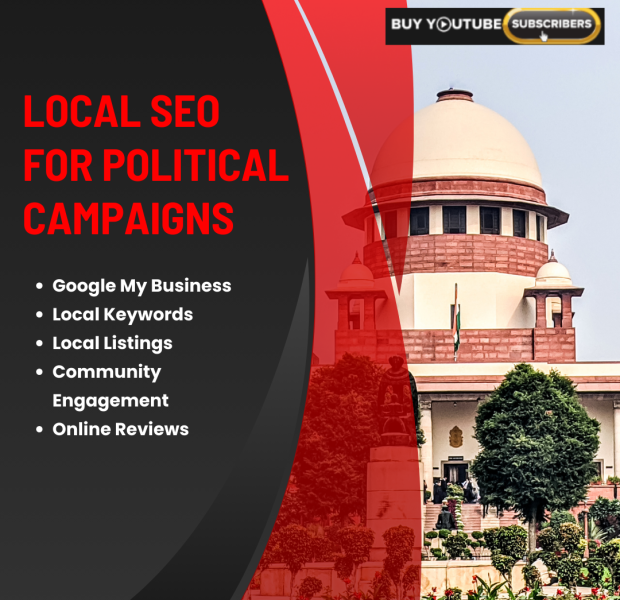How SEO Strategies Can Elevate Your Political Campaign?
Boost political campaigns’ visibility online using SEO strategies to reach and engage more voters effectively.
In the digital age, political campaigns are no longer confined to traditional media; they extend into the vast realm of the internet. With millions of potential voters online, political candidates and parties need to adopt effective strategies to reach their audience. This is where SEO for Political Campaigns comes into play. By utilizing SEO, we can enhance a campaign’s visibility on search engines, ensuring that candidates’ messages resonate with voters and remain relevant throughout the campaign period.
At our company, we understand that a well-optimized political campaign can significantly impact the outcome of elections. Through strategic SEO techniques, we can help political candidates establish a solid online presence, engage voters effectively, and drive them to take action—whether that’s visiting a campaign website, signing up for newsletters, or making donations. In this article, we will explore various aspects of SEO explicitly tailored for political campaigns, including keyword research, on-page and off-page strategies, content development, local SEO, and the importance of analytics in monitoring success.
Keyword Research for Political Campaigns
Keyword research is the backbone of effective SEO. In the context of political campaigns, understanding what potential voters are searching for online is crucial. At our company, we begin by identifying relevant keywords and phrases that resonate with the target audience. This includes terms related to the candidate’s platform, local issues, and frequently searched questions about the election process.
To conduct thorough keyword research, we employ various tools, such as Google Keyword Planner, SEMrush, and Ahrefs. These tools help us discover high-volume keywords with lower competition, allowing our clients to rank higher on search engine results pages (SERPs). Additionally, we encourage our clients to focus on long-tail keywords, which are more specific phrases that often lead to higher conversion rates. For example, instead of targeting a broad keyword like “education policy,” we might focus on “education policy for underprivileged communities in [location].”
Incorporating the identified keywords throughout the website content, including meta titles, descriptions, headings, and body text, helps improve the website’s relevance and visibility. This is a vital step in SEO for Political Campaigns, as it allows candidates to connect with voters on topics they care about most.


On-Page SEO Strategies for Political Campaigns
On-page SEO refers to the practice of optimizing individual web pages to rank higher and earn more relevant traffic in search engines. For political campaigns, on-page SEO strategies are crucial in ensuring that campaign websites effectively convey the candidate’s message while also attracting potential voters.
- Title Tags and Meta Descriptions: These elements serve as a first impression for search engine users. We ensure that title tags are compelling and include primary keywords, while meta descriptions provide a concise summary of the page’s content, enticing users to click through.
- Header Tags: Utilizing header tags (H1, H2, H3) helps structure the content and makes it easier for search engines to understand the hierarchy of information. We recommend including keywords in these headers to improve relevance.
- Image Optimization: Images are a crucial aspect of a campaign website, often showcasing rallies, events, and candidates. We ensure that images are optimized with descriptive file names and alt text containing relevant keywords, improving both accessibility and SEO.
- Internal Linking: Creating a network of internal links throughout the website allows search engines to crawl the site more effectively while also guiding visitors to other relevant content. This enhances user experience and encourages longer site visits.
- Mobile Optimization: With a significant portion of voters accessing information through mobile devices, our company prioritizes mobile-friendly designs. This involves responsive web design and fast-loading pages to reduce bounce rates.
By implementing these on-page SEO strategies, we help political campaigns effectively communicate their message while enhancing their visibility online.
Technical SEO for Political Websites
Technical SEO focuses on optimizing a website’s infrastructure to facilitate search engines’ crawling and indexing. For political campaigns, technical SEO is essential in ensuring that a campaign website runs smoothly and efficiently.
1. Site Speed: A slow-loading website can deter potential voters. To enhance overall site performance, we conduct speed tests, optimize images, leverage browser caching, and minimize server response times.
2. XML Sitemap: We create and submit an XML sitemap to search engines, making it easier for them to crawl and index the website. This is particularly important during high-traffic periods, such as election season.
3. Robots.txt File: This file tells search engines which pages to crawl and which to ignore. Our team ensures that the robots.txt file is configured correctly, preventing search engines from indexing irrelevant pages.
4. Secure Website (HTTPS): Security is a priority, especially when dealing with sensitive information. We ensure that all campaign websites are secured with HTTPS, which not only protects user data but also improves search engine rankings.
5. Mobile Usability: Technical SEO also includes ensuring that a website is mobile-friendly. Our company conducts mobile usability tests to identify and fix any issues that may hinder user experience on mobile devices.
By addressing these technical aspects, we create a strong foundation for SEO for Political Campaigns, allowing candidates to focus on engaging voters.


Content Strategy for Political SEO
Content is king in the world of SEO, and for political campaigns, creating high-quality, relevant content is crucial. At our company, a well-planned content strategy not only informs voters but also engages them and encourages them to take action.
- Campaign Messaging: The content should reflect the candidate’s values, beliefs, and platform. We work closely with candidates to ensure that their messaging is clear, concise, and resonates with the target audience.
- Blogging: Regularly publishing blog posts on relevant topics can help establish the candidate as an authority in their field. We recommend addressing local issues, current events, and frequently asked questions to engage voters and drive traffic to the website.
- Video Content: Videos can be a powerful tool for political campaigns. We suggest creating videos that highlight the candidate’s platform, showcase events, or provide insights into the candidate’s daily life. These videos can be shared on social media and embedded on the campaign website to enhance engagement.
- Social Media Integration: Sharing content across social media platforms amplifies reach and engagement. We encourage our clients to promote their blog posts, videos, and events on platforms like Facebook, Twitter, and Instagram, driving traffic back to the campaign website.
- Calls to Action (CTAs): Every piece of content should include clear CTAs, encouraging voters to take the next step—whether it’s signing up for a newsletter, volunteering, or donating. We work with candidates to create compelling CTAs that align with their campaign goals.
By implementing a robust content strategy, we enhance the overall effectiveness of SEO for Political Campaigns, ensuring that candidates can connect with voters and convey their messages effectively.
Off-Page SEO and Link Building for Political SEO
Off-page SEO refers to activities performed outside of a website to improve its visibility and authority. For political campaigns, building a solid online reputation through link-building is essential for establishing credibility and authority.
1. Link Building: We prioritize acquiring high-quality backlinks from reputable sources, such as news websites, political blogs, and relevant organizations. Backlinks act as endorsements, signaling to search engines that the campaign website is trustworthy and authoritative.
2. Guest Blogging: Writing guest posts for reputable websites allows us to showcase the candidate’s expertise while earning valuable backlinks. This strategy not only drives traffic but also increases visibility among new audiences.
3. Social Media Engagement: Active participation on social media platforms can generate buzz around the campaign. By sharing content and engaging with followers, we increase the likelihood of others linking back to the campaign website.
4. Local Partnerships: Collaborating with local organizations, community leaders, and influencers can help amplify the campaign’s message. We encourage our clients to build relationships within their communities, leading to increased visibility and potential backlink opportunities.
5. Online Reputation Management: Maintaining a positive online reputation is crucial in the competitive landscape of political campaigns. We monitor online mentions of the candidate and promptly address any harmful content to protect the campaign’s image.
Through effective off-page SEO strategies, we enhance the authority of SEO for Political Campaigns, helping candidates stand out in a crowded field.
SEO for Political Blogs and Articles
Political blogs and articles serve as platforms for candidates to express their opinions, share insights, and connect with voters. Optimizing these blogs and articles is crucial for political campaigns to ensure they reach the intended audience.
1. Keyword Integration: Just like with website content, we incorporate relevant keywords into blog posts and articles to improve their visibility on search engines. This includes using primary keywords in titles, headers, and throughout the content.
2. Engaging Headlines: Crafting compelling headlines is essential for capturing readers’ attention. We focus on creating headlines that evoke curiosity and encourage clicks while including relevant keywords.
3. Content Length and Quality: Longer, well-researched articles tend to perform better in search engine rankings. We aim for a minimum word count of 1,000 words for blog posts, ensuring they provide valuable insights and information.
4. Multimedia Integration: Including images, videos, and infographics in blog posts can enhance engagement and make content more shareable. We advise our clients to use multimedia elements to break up text and make posts visually appealing.
5. Encouraging Engagement: At the end of each blog post, we include questions or prompts encouraging readers to share their thoughts in the comments. This fosters community engagement and can lead to increased shares on social media.
By optimizing political blogs and articles, we enhance the effectiveness of SEO for Political Campaigns, ensuring that candidates can effectively communicate with voters and drive engagement.
Local SEO for Political Campaigns
Local SEO is crucial for political campaigns, as candidates often seek to engage voters within specific geographical areas. At our company, we prioritize local SEO strategies to enhance a candidate’s visibility in their local community.
- Google My Business: We help candidates create and optimize their Google My Business profiles, ensuring accurate information, including contact details, campaign office locations, and hours of operation. This enhances local search visibility and makes it easier for voters to find the candidate.
- Local Keywords: Incorporating local keywords into website content and blog posts is essential for targeting voters in specific areas. We advise clients to include city names, neighborhoods, and local issues to improve local search rankings.
- Local Listings: Ensuring the candidate’s campaign is listed on relevant local directories and community websites can improve visibility. We work to secure listings on platforms like Yelp and local news websites, which can drive traffic and enhance credibility.
- Community Engagement: Active participation in local events, town halls, and community initiatives can boost a candidate’s visibility. We encourage our clients to document these engagements through blog posts, social media updates, and videos linking back to the campaign website.
- Online Reviews: Encouraging supporters to leave positive reviews on Google and social media platforms can enhance the candidate’s reputation. We guide our clients on how to solicit reviews and respond to feedback to maintain a positive online presence.
By focusing on local SEO strategies, we ensure that SEO for Political Campaigns is tailored to connect candidates with their constituents effectively.

SEO Analytics and Monitoring for Political Campaigns
Analytics and monitoring are critical components of a successful SEO strategy. By tracking performance metrics, we can assess the effectiveness of our SEO efforts and make data-driven decisions for continuous improvement.
1. Google Analytics: We utilize Google Analytics to monitor website traffic, user behavior, and conversion rates. This data allows us to understand how visitors interact with the site and identify areas for improvement.
2. Keyword Rankings: Regularly tracking keyword rankings helps us gauge the effectiveness of our keyword strategy. We monitor changes in rankings and adjust our approach based on performance.
3. Conversion Tracking: We set up conversion tracking to measure the effectiveness of specific actions on the website, such as sign-ups, donations, and volunteer registrations. This data is crucial for evaluating the success of the campaign’s online efforts.
4. A/B Testing: Implementing A/B tests on landing pages, CTAs, and content can provide insights into what resonates most with voters. We analyze the results to refine our strategies and improve conversion rates.
5. Regular Reporting: We provide clients with regular reports detailing key performance metrics and insights. This transparency allows candidates to understand the impact of SEO on their campaign and make informed decisions moving forward.
By focusing on analytics and monitoring, we ensure that our approach to SEO for Political Campaigns is data-driven and results-oriented.
How Voice Search and AI Assistants are Changing Political SEO?
As technology continues to evolve, so does the landscape of SEO. The rise of voice search and AI assistants is transforming how voters access information about political candidates. At our company, we recognize the importance of adapting our SEO strategies to stay ahead of these changes.
- Natural Language Processing: Voice search queries tend to be longer and more conversational. We adjust our keyword strategy to include long-tail phrases and questions that reflect how voters might verbally inquire about candidates and issues.
- Local Search Optimization: Voice search is often used for local inquiries, such as “Who is running for mayor in [location]?” We ensure that local SEO strategies are in place to capture these searches effectively.
- Structured Data Markup: Implementing structured data markup helps search engines understand the content better, increasing the chances of being featured in voice search results. We work on integrating schema markup for events, FAQs, and local information.
- Optimizing for Featured Snippets: Voice assistants often pull answers from featured snippets. We focus on optimizing content to be concise and directly address common questions, improving the likelihood of being chosen as a source for voice search.
- AI Content Creation: The use of AI in content creation is becoming more prevalent. While we believe in the importance of human touch and authenticity, we also recognize the potential for AI to assist in generating data-driven insights and automating repetitive tasks.
By adapting to the changes brought about by voice search and AI assistants, we enhance our SEO for Political Campaigns, ensuring that candidates remain accessible to voters through evolving technologies.

